
 |
|
Junebug (2005) Cast: Embeth Davidtz, Alessandro Nivola, Amy Adams, Ben McKenzie, Scott Wilson, Celia Weston, Frank Hoyt Taylor, Joanne Pankow, Beth Bostic, Tarra Jolly 2005 – 107 minutes Rated: Reviewed by Dustin Putman, August 27, 2005. 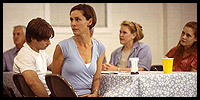 "Junebug" is a warm and honest gem of a movie, a slice-of-life unblinkingly accurate in its look at the dynamics of a family, frequently laugh-out-loud funny in surprising and genuine ways, and quietly touching without forcing obvious emotions on the viewer. A big hit at 2005's Sundance Film Festival, this beautifully realized art-house release has definite breakout potential if positive word is able to pass quickly enough in the few cities showing it. If not, then its day will come on DVD and cable, where a wider audience will undoubtedly be charmed by a pitch-perfect script (by Angus MacLachlan) and characters that just about anyone will be able to recognize as people they know in their own life.
"Junebug" is a warm and honest gem of a movie, a slice-of-life unblinkingly accurate in its look at the dynamics of a family, frequently laugh-out-loud funny in surprising and genuine ways, and quietly touching without forcing obvious emotions on the viewer. A big hit at 2005's Sundance Film Festival, this beautifully realized art-house release has definite breakout potential if positive word is able to pass quickly enough in the few cities showing it. If not, then its day will come on DVD and cable, where a wider audience will undoubtedly be charmed by a pitch-perfect script (by Angus MacLachlan) and characters that just about anyone will be able to recognize as people they know in their own life.
 In its telling of the culture clash between a tight-knit North Carolina family and the more worldly cosmopolitan newlywed wife one of the grown sons brings home, "Junebug" is deliberately paced but never boring, low-key but splendidly entertaining, light on plot but heavy on profundity found within the mundane aspects of life. After a first couple of shaky introductory scenes, the picture finds its footing and intoxicatingly draws you in. George (Alessandro Nivola) is the one who got away, the eldest son in a distinctly Southern family who regrettably brings his new wife, Chicago art dealer Madeleine (Embeth Davidtz), to meet them. Madeleine, who has initially gone to win over and sign a promising, offbeat new artist nearby, is jarred by her new in-laws and their simpler way of life, but tries not to let it show.
In its telling of the culture clash between a tight-knit North Carolina family and the more worldly cosmopolitan newlywed wife one of the grown sons brings home, "Junebug" is deliberately paced but never boring, low-key but splendidly entertaining, light on plot but heavy on profundity found within the mundane aspects of life. After a first couple of shaky introductory scenes, the picture finds its footing and intoxicatingly draws you in. George (Alessandro Nivola) is the one who got away, the eldest son in a distinctly Southern family who regrettably brings his new wife, Chicago art dealer Madeleine (Embeth Davidtz), to meet them. Madeleine, who has initially gone to win over and sign a promising, offbeat new artist nearby, is jarred by her new in-laws and their simpler way of life, but tries not to let it show.
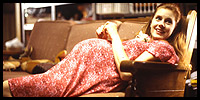 In a dumber, more predictable film, this character diversity would put a strain on Madeleine and George's marriage, and begin a big feud with the rest of the family members. In "Junebug," though, that isn't the case. Madeleine may recognize the differences between herself and her new family, but she opens herself up and embraces all of them. These include George's parents, crafty Peg (Celia Weston) and woodworking enthusiast Eugene (Scott Wilson), as well as George's disgruntled younger brother, Johnny (Ben McKenzie), and his bubbly pregnant wife, Ashley (Amy Adams). Ashley, the picture's most lovable human creation, is one of those people who brings a talkative attitude and sunny disposition to every occasion as she floats through life to her own joyous tune. With the introduction of experienced city gal Madeleine, Ashley immediately admires this new family member beyond words, affectionately latching onto her from the get-go and subtly trying to emulate facets of Madeleine's personality in her own daily life. It isn't all sunshine and roses for Ashley, however, for her usual positive outlook remains clouded when it comes to the rocky state of her relationship with husband Johnny, her high school sweetheart. She tells Madeleine she holds out hope that he'll snap out of it once the baby arrives, that her pregnancy might be the catalyst for his standoffish nature. "How long has he been like this?" Madeleine asks her. Ashley's reply: "Two years."
In a dumber, more predictable film, this character diversity would put a strain on Madeleine and George's marriage, and begin a big feud with the rest of the family members. In "Junebug," though, that isn't the case. Madeleine may recognize the differences between herself and her new family, but she opens herself up and embraces all of them. These include George's parents, crafty Peg (Celia Weston) and woodworking enthusiast Eugene (Scott Wilson), as well as George's disgruntled younger brother, Johnny (Ben McKenzie), and his bubbly pregnant wife, Ashley (Amy Adams). Ashley, the picture's most lovable human creation, is one of those people who brings a talkative attitude and sunny disposition to every occasion as she floats through life to her own joyous tune. With the introduction of experienced city gal Madeleine, Ashley immediately admires this new family member beyond words, affectionately latching onto her from the get-go and subtly trying to emulate facets of Madeleine's personality in her own daily life. It isn't all sunshine and roses for Ashley, however, for her usual positive outlook remains clouded when it comes to the rocky state of her relationship with husband Johnny, her high school sweetheart. She tells Madeleine she holds out hope that he'll snap out of it once the baby arrives, that her pregnancy might be the catalyst for his standoffish nature. "How long has he been like this?" Madeleine asks her. Ashley's reply: "Two years."
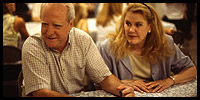 For first-time feature director Phil Morrison (who previously cut his teeth on Comedy Central's "Upright Citizens Brigade"), "Junebug" assuredly welcomes him as a completely fresh talent. Even when his film is touching upon material that isn't exactly groundbreaking, Morrison brings a rare detail and tonal exquisiteness to each scene that makes it all feel new again. There are no stereotypes present, nor is there a hint of condescension to his characters based on their class or status; he simply views them, albeit affectionately, as they really are, each with with their own respective qualities and flaws. So clearly realized and nuanced are the people and their interactions in "Junebug"—at home, at work, at community potlucks—that they only go to show how downright cookie-cutter the majority of mainstream studio fare is.
For first-time feature director Phil Morrison (who previously cut his teeth on Comedy Central's "Upright Citizens Brigade"), "Junebug" assuredly welcomes him as a completely fresh talent. Even when his film is touching upon material that isn't exactly groundbreaking, Morrison brings a rare detail and tonal exquisiteness to each scene that makes it all feel new again. There are no stereotypes present, nor is there a hint of condescension to his characters based on their class or status; he simply views them, albeit affectionately, as they really are, each with with their own respective qualities and flaws. So clearly realized and nuanced are the people and their interactions in "Junebug"—at home, at work, at community potlucks—that they only go to show how downright cookie-cutter the majority of mainstream studio fare is.
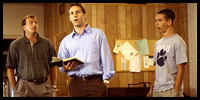 Because there are no showy plot developments—although there are, to be certain, small surprises and discoveries that come naturally out of the observations of their day-to-day lives—the picture hinges on its ensemble cast to bring it to life, and they do not disappoint. The performances are just about faultless, each actor embodying their role so completely and convincingly that it hardly seems like acting at all. Embeth Davidtz (2002's "The Emperor's Club") makes Madeleine a kind, open-minded protagonist, a woman who only after she marries George begins to find that there is a lot about him left to discover, as when, at the town's banquet, he leads a soulful hymn before they eat.
Because there are no showy plot developments—although there are, to be certain, small surprises and discoveries that come naturally out of the observations of their day-to-day lives—the picture hinges on its ensemble cast to bring it to life, and they do not disappoint. The performances are just about faultless, each actor embodying their role so completely and convincingly that it hardly seems like acting at all. Embeth Davidtz (2002's "The Emperor's Club") makes Madeleine a kind, open-minded protagonist, a woman who only after she marries George begins to find that there is a lot about him left to discover, as when, at the town's banquet, he leads a soulful hymn before they eat.
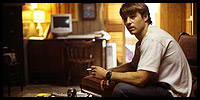 Most known from TV's teen soap opera, "The O.C.," Ben McKenzie is a startling find in a part that separates him from his television counterpart and calls for a dramatic range that hadn't before been tapped into. His Johnny is an interesting character, one who married before high school graduation and resents brother George for having left to pursue career aspirations he himself may never get the chance to do. A simple scene where he unsuccessfully attempts to record a program on TV for Ashley about meerkats—her favorite animal—not only has more tension than in the whole of the recent worthless monster movie, "The Cave," but unlocks a gentle, sympathetic side to Johnny and his love for his wife that he has difficulty showing on the outside. As Ashley, Amy Adams (2005's "The Wedding Date") is a revelation, exuding such an innocence and goodness about her that you find yourself actively wishing the best for her. Adams was the winner of the Sundance award for Best Actress, and deservedly so; this is one of the year's standout performances, both heartbreaking and brilliantly funny, often concurrently.
Most known from TV's teen soap opera, "The O.C.," Ben McKenzie is a startling find in a part that separates him from his television counterpart and calls for a dramatic range that hadn't before been tapped into. His Johnny is an interesting character, one who married before high school graduation and resents brother George for having left to pursue career aspirations he himself may never get the chance to do. A simple scene where he unsuccessfully attempts to record a program on TV for Ashley about meerkats—her favorite animal—not only has more tension than in the whole of the recent worthless monster movie, "The Cave," but unlocks a gentle, sympathetic side to Johnny and his love for his wife that he has difficulty showing on the outside. As Ashley, Amy Adams (2005's "The Wedding Date") is a revelation, exuding such an innocence and goodness about her that you find yourself actively wishing the best for her. Adams was the winner of the Sundance award for Best Actress, and deservedly so; this is one of the year's standout performances, both heartbreaking and brilliantly funny, often concurrently.
 There is no doubting that "Junebug" is a small movie, both in size and budget, but what it offers up in the form of thematic relevance and internal complexity is rich and sweeping. There is a view of human nature on hand—much of it left hidden from those around them—that is quite telling and painfully truthful of the way we as humans behave and relate to each other. It is in this wisdom, unaffected and instinctively forthright and never less than humane, that "Junebug" transcends other like-minded family dramedies. When Madeleine and George depart at the end of the movie, headed back to the hustle and bustle of Chicago, there is a sense that Madeleine has grown as a person and widened her horizons in a way that she never did traveling internationally with her family as a child. And then George tells her how glad he is to be out of there and headed home—to their home. We know what he means.
There is no doubting that "Junebug" is a small movie, both in size and budget, but what it offers up in the form of thematic relevance and internal complexity is rich and sweeping. There is a view of human nature on hand—much of it left hidden from those around them—that is quite telling and painfully truthful of the way we as humans behave and relate to each other. It is in this wisdom, unaffected and instinctively forthright and never less than humane, that "Junebug" transcends other like-minded family dramedies. When Madeleine and George depart at the end of the movie, headed back to the hustle and bustle of Chicago, there is a sense that Madeleine has grown as a person and widened her horizons in a way that she never did traveling internationally with her family as a child. And then George tells her how glad he is to be out of there and headed home—to their home. We know what he means.
|
© 2008 by Dustin Putman |














